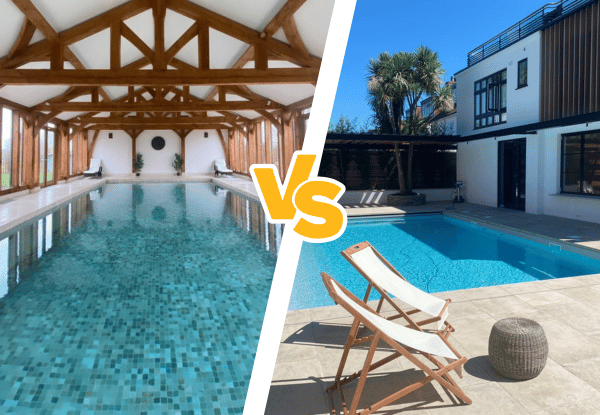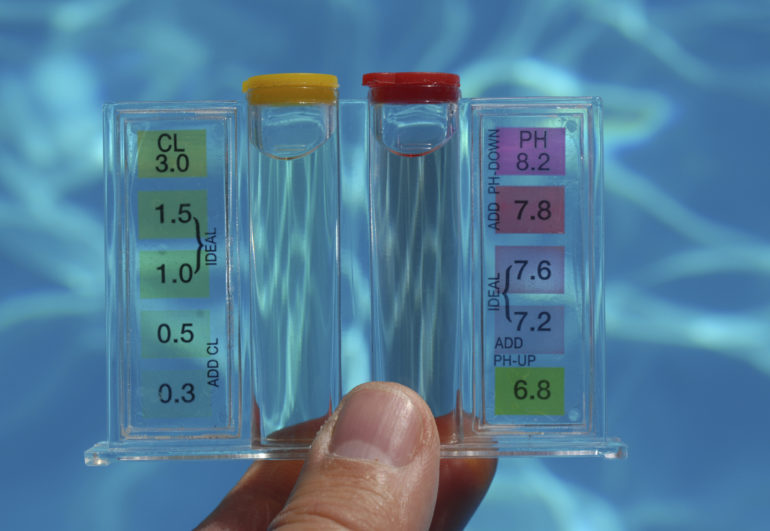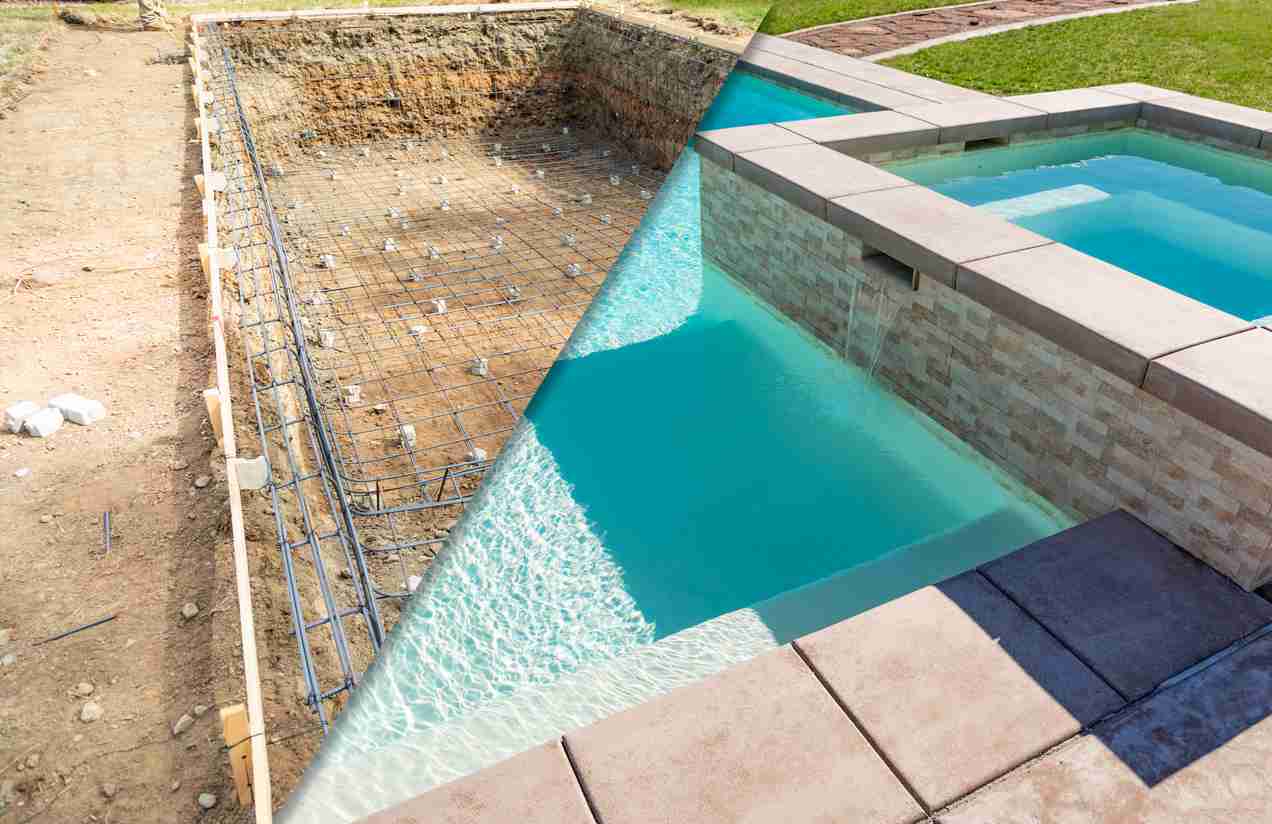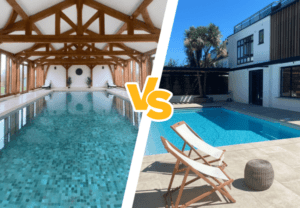Regular Cleaning and Skimming
The pleasure of jumping into a crystal-clear pool on a hot day is directly correlated with the cleanliness of the water and pool maintenance.
Regular pool maintenance isn’t just for the pool’s aesthetically looking: it’s critical to ensuring a clean, healthy, and welcoming environment for everyone. With a regular maintenance schedule, you can enjoy the benefits of a nice pool, with improved aesthetics, safety, and extended life for your pool. There are basic pool maintenance tips to keep your pool water clear so that your pool remains the cool and nice part of your outdoor living space.
The key to preserving the clarity and safety of your pool lies in regular cleaning and surface skimming. These measures are crucial to prevent pollutants from compromising the water’s quality and appearance.
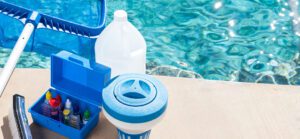
Daily skimming
The most important aspect of pool maintenance is the daily removal of leaves, debris, and insects from the surface of the water. This practice is essential for numerous reasons:
- It keeps debris from sinking, decomposing, and promoting the growth of algae, which not only ruins the appearance of the pool but can also create a slippery hazard.
- Clearwater is vital for ensuring swimmers can see each other to avoid accidents. Daily cleaning is a simple but effective measure to keep your pool clean and safe.
Weekly vacuuming
Vacuuming weekly and cleaning the sides and bottom of the pool is important to keep it in good condition.. This maintenance operation removes dirt, trash, and stuck-on algae, which prevents unsightly stains and prevents the spread of algae. Regular vacuuming and brushing not only enhance the visual appeal of your pool but also foster a healthier swimming environment by ensuring the water remains clean and inviting.
Maintaining Chemical Balance
Maintaining the optimal chemical balance in your pool is critical for creating a safe and enjoyable swimming space. The chemical composition of your pool water has a significant impact on everything from water clarity and swimmer comfort to the integrity and longevity of the pool’s surfaces and equipment. Effective management of this balance is key:
Checking the water chemistry
A cornerstone of pool maintenance is regular testing of the pool water chemistry. This includes checking pH, chlorine, and alkalinity levels to make sure they are within safe and effective ranges. Proper chemical balance is essential for the safety of swimmers, preventing issues such as eye and skin irritation and ensuring the pool’s sanitization process is effective. Regular water testing can fast correct any chemical imbalance, keeping your pool water attractive and healthy.
Adjusting Chemicals
After recognizing the current condition of the pool water through testing, the next step is to make the appropriate chemical adjustments to maintain or achieve the ideal balance. This could mean elevating the chlorine levels to ensure the water is properly disinfected or modifying the pH levels by adding specific chemicals. It is vital to adhere to the manufacturer’s guidelines and apply the correct dosages of chemicals. This ensures the safety and cleanliness of the pool water for everyone’s enjoyment.
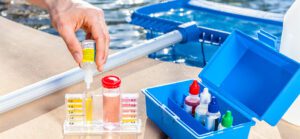
Pool Filtration System Care
The filtration system is important for maintaining the cleanliness and clarity of your pool’s water. Ensuring your filtration system is well-maintained is key to clear water.
Regular Filter Maintenance
t, Filters play a key role in keeping your pool water clean by filtering out dirt. Here are steps to ensure your filters are functioning effectively:
- Determine the type of filter: Pools may have sand, cartridge, or diatomaceous earth (DE) filters. The cleaning process for each is a little different.
- Turn off the pump: Always turn off the filtration system before cleaning or replacing filters.
- Clean or replace the filter: Sand filters should be washed according to the manufacturer’s instructions. Cartridge filters should be removed and hosed down to remove debris. DE filters require backwashing and adding fresh DE powder.
- Inspect filters for damage: While cleaning, inspect filters for signs of wear or damage. Replace them if necessary to ensure optimum performance.
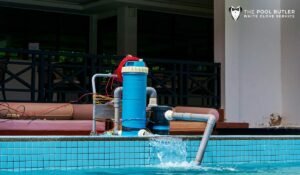
Optimal filtration time
To ensure your pool water remains clean and hygienic, managing the operation time of your pool’s filtration system is important. Here’s how to optimize this the main aspect:
- Daily operation: For routine maintenance, it’s advised to run your pool’s filtration system between 8 to 12 hours a day, particularly throughout the peak swimming season. This duration guarantees that water is adequately circulated and filtered multiple times, effectively capturing and removing contaminants.
- Adjust based on heavy use: During long-term use or after unfavorable weather conditions such as a storm, it is advisable to increase the filtration time. This control will help to quickly deal with additional dirt and ensure that the water is quickly restored to clean and safe water during these periods.
Seasonal Maintenance Tips
Seasonal changes demand different maintenance strategies to keep your pool in top condition year-round.
Opening Your Pool
Properly opening your pool for the season sets the stage for clear water and problem-free operation:
- Remove the Pool Cover Carefully: Avoid spilling any trash into the pool water.
- Clean and Adjust Water Levels: Thoroughly clean the pool and fill it to the appropriate level.
- Re-establish Chemical Balance: Test the water and adjust the chemicals to reach the ideal balance. This may include pH, chlorine, and alkalinity levels.
- Run the Filtration System: Initially, run your pool’s filtration system continuously for 24 to 48 hours to circulate the chemicals and clear any winter debris.
Winterizing Your Pool
Preparing your pool for winter helps protect it from damage and makes spring opening easier:
- Balance the Water Chemistry: Adjust the water’s chemical balance to prevent algae growth and protect pool surfaces.
- Lower the Water Level: This prevents freezing and potential damage to the pool structure and filtration system.
- Add Winterizing Chemicals: These help prevent algae and bacteria growth during the off-season.
- Cover the Pool: Use a quality cover to protect the pool from trash and reduce the risk of freezing.
Addressing Common Pool Problems
Despite meticulous care, pool owners may face typical issues that compromise the clarity of their pool water.
Algae Prevention and Treatment
Algae, with its capacity to quickly cloud and discolor pool water, remains a frequent concern. To prevent algae growth, you should monitor the pool’s chemical balance, clean the surface regularly, and apply algaecide as needed.
Managing Water Loss
Water reduction in pools can result from evaporation or leaks. It’s important to regularly inspect the pool’s structure and its filtration system for any leak indicators. Keeping the water at its designated level is imperativ for the filtration system’s optimal performance and to avert potential harm to pool infrastructure.
Professional Pool Maintenance Services
While personal pool maintenance is key to maintaining the clarity of your pool water, there are times when the expertise of professional services is invaluable. Recognizing when to call professional help can not only save time but also ensure that your pool is kept in perfect condition.
When to Call the Professionals
Professional pool maintenance services become extremely important under several circumstances:
- Opening/Closing Your Pool: The transition between seasons demands specific adjustments and treatments to ready your pool for upcoming months or to winterize it. Professionals handle these tasks efficiently, ensuring your pool is prepared for what’s next.
- Complex Issues: Issues such as continuous algae growth, cloudy water despite routine care, or potential leaks are best resolved by specialists. Their expertise, tools, and experience enable them to tackle these challenges successfully.
- Equipment Installation or Repair: Setting up new or fixing existing pool equipment can be challange. Professional services guarantee correct installation or repair, vital for maintaining water clarity.
Choosing a Pool Service Provider
Choosing the right service provider is essential for superior pool care. Here are factors to consider when looking for a right pool builder:
- Check Credentials: Choose services with the necessary licenses, insurance, and certifications, assuring they adhere to industry norms.
- Experience and Reputation: Select companies known for their positive feedback from customers. Seasoned providers are more likely to deliver effective and efficient services.
- Services Offered: Make sure the provider can cater to your specific needs, be it regular maintenance, repairs, or handling seasonal requirements.
- Cost Transparency: A reputable service will provide clear pricing without hidden fees. Request detailed quotes to compare services and costs effectively.
Maintaining clear pool water reflects a commitment to consistent maintenance. and care. This guide has not only shared pivotal DIY maintenance tips but also underscored the significance of professional pool services for particular needs. From ensuring your pool’s filtration system is properly cared for to managing typical issues and knowing when professional help is needed, these measures aim to keep your pool water welcoming and secure.
Routine care forms the foundation of a well-maintained pool setting. Establish and adhere to a maintenance schedule, be attentive to your pool’s requirements, and don’t hesitate to engage professionals for intricate problems or seasonal preparations. By being proactive and recognizing when to call in experts, you can ensure your pool remains a pristine haven for years to come.
